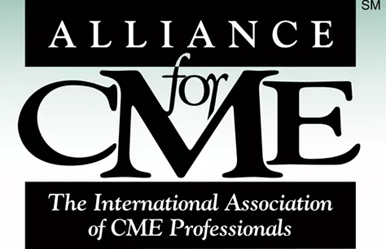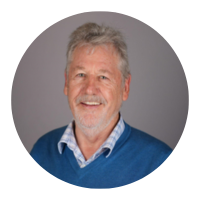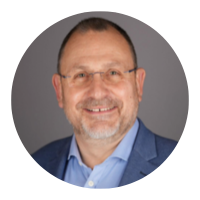Editor's Note: In memory of Ronald (Ron) T. Murray, Ed.D., CHCP, FACEHP, MRSB, PGCE, whose remarkable contributions to the CME/CPD community, including his role as secretary for the Global Alliance for CME, will always be cherished. Ron's dedication, mentorship and vibrant spirit profoundly enriched the field. We extend our heartfelt gratitude for his invaluable contributions, including this article, completed before his untimely passing. Our deepest condolences go out to his family and loved ones. His otibutary has been published and can be found linked here.

In what sometimes seems like the mists of time, the Alliance for CME used to boldly state their commitment to CME on an international level, branded as “The International Association of CME Professionals” (Figure 1). The Alliance for CME has since revisited its mission and was renamed to the Alliance for Continuing Education in the Health Professions (ACEhp).

Figure 1: The Almanac cover in 2006
This commitment to international CME was forged by the Alliance’s founder, Lew Miller, whose interest in CME around the world prompted him to form another international organization, the Global Alliance for Medical Education (GAME), in 1995. Since then, GAME has continued to promote CME/CPD globally with the mission: “To serve as the international organization of leaders advancing innovation and collaboration in CME/CPD worldwide, with the goal of improving patient care.” (1)
While an international approach to aspects of CME/CPD was an important component of the Alliance’s activities in the past, this focus seemed to diminish over recent years. However, a review of the Alliance 2024 Annual Conference program, held Feb. 5–8 in New Orleans, suggests a renewed interest in exploring these topics. One of the learning tracks for the meeting included “Global CPD” under “Evolving and Emerging Trends”, while two specific sessions addressed this renewed interest. See the annual conference’s full program for reference, including the following sessions:
- Planning Educational Programs in Europe: Understanding the Updated EACCME Accreditation Criteria
- Considerations for Global Education
While these two sessions offered topical and pertinent learning opportunities, we would like to suggest emerging and existing resources for Almanac readers to delve further into the somewhat convoluted and confusing arena of international CME/CPD, particularly in Europe.
Many stakeholders in the wider CME/CPD community have devoted resources to international efforts, including some of the funding organizations familiar to Alliance members. These organizations have established international sections to provide grants for Independent Medical Education (IME). The Accreditation Council for Continuing Medical Education (ACCME) and other accreditation organizations have developed collaborative entities, such as the International Academy for CPD Accreditation (IACPDA), (2) to offer mentoring programs for organizational and national use. These programs facilitate the move toward international accreditor harmonization, benefiting CME/CPD providers worldwide.
Currently, there is no specific pan-European mandate for the accreditation of CME/CPD, as might be recommended by the European Commission, an executive branch of the European Union. Accreditation systems in Europe are governed on a national level through the National Accrediting Authorities (NAAs), which are country-specific entities, either central or regional, such as the royal colleges, chambers of physicians, medical associations and universities. However, there are routes for pan-European accreditation. The European Accreditation Council for CME (EACCME) (3), established by the Union of European Medical Specialists (UEMS), serves this purpose and has agreements with many of these European NAAs. UEMS also has an agreement with the American Medical Association (AMA) for the mutual recognition of EACCME European CME Credits (ECMEC®s) and AMA PRA Category 1 Credit™ (4). This is also the case with another pan-European CME accreditor, the European Board for Accreditation of Continuing Education for Health Professionals (EBAC) (5, 6), which additionally has a Substantial Equivalency agreement with the ACCME (7).
Other pan-European, specialty-specific accreditors are typically associated with a European medical society, such as the European Board for Accreditation in Hematology (EBAH) (8) and the ESMO-MORA program of the European Society of Medical Oncology (ESMO) (9). Activity accreditation is still the norm in Europe, with one notable exception — the European Board for Accreditation in Cardiology (EBAC), which runs an accredited provider system alongside activity accreditation.
Several other organizations use resources to support CME/CPD on an international basis. For example, the Association for Medical Education in Europe (AMEE) rebranded itself as the International Association for Health Professions Education, expanding its education phases to include CPD (10). AMEE is a partner organization with the World Federation for Medical Education (WFME), which has published a set of global standards for CPD (11). These standards have also been adapted by the World Organisation of Family Doctors (WONCA) to promote best practices in CPD designed for family medicine practitioners (12).
We’ve seen a rise in the number of European CME/CPD providers who are committed to develop, implement and evaluate activities based on recognized principles of IME. Some have become ACCME-accredited providers, opening doors for collaboration via joint providership outside the U.S. Additionally, several providers have formed a coalition known as the Good CME Practice group, whose mission is to promote professionalism within the European CME provider community and enhance their competence to deliver high-quality independent education for healthcare professionals (13).
Professional development for European and other CME/CPD providers has become increasingly available through the resources of the European CME Forum (14), which brings together representatives of all stakeholder groups from around the world to discuss current topics advancing high-quality CME/CPD in Europe. The European CME Forum has a well-established link in the U.S. with ACEhp and ACCME, with representatives of each organization serving as regular contributors to the annual meeting held each November. The Journal of CME (JCME), which is the journal of the European CME Forum, is a peer-reviewed journal. It publishes articles focused on the practical application of global CME/CPD methods. Additionally, it includes reviews, short communications and special collections on the themes of outcomes, digitization, innovation/impact and voices in CME/CPD (15).
The journal was previously known as the Journal of European CME. The decision to remove “European” from its name reflects its increasing scope, number of submissions and readership extending beyond European borders. With a broader target audience, it offers Almanac readers and Alliance members further opportunities to share details of their work in CME/CPD or to express their views and experiences on topical issues with a global perspective.
Consideration of international topics has appeared in the Almanac in previous articles by Murray and Maisonneuve published in 2006 (16) and 2010 (17) that provided some snapshots regarding the provision and regulation of CME/CPD as it morphed toward CPD in Europe. Further background information can also be gleaned from the literature in articles by Sandars (18) and in various views and analysis pieces on CME/CPD in Europe published by pharmaforum.com that share learnings from the pharmaceutical industry. One example is “CME in Europe: a fragmented environment” (19). There has also been much discussion in the pages of the Journal of CME, such as the recent letter from Ghidinelli, et al., outlining challenges that face CME/CPD providers in the European arena (20).
In summary, the landscape of CME/CPD in Europe is complex, multilevel, multilingual and multi-regulatory. It is in a period of rapid change that provides many opportunities for collaboration in the provision of targeted CME/CPD.
If readers are interested in any of these topics, please feel free to contact Eugene Pozniak for a chat: epozniak@cmeforum.org.
References
- Global Alliance for CME (GAME). Home. Available from: https:/gamecme.org (accessed 17 January 2024)
- International Academy for CPD Accreditation. International Academy for CPD Accreditation. Available from: https://academy4cpd-accreditation.org (accessed 17 January 2024)
- European Accreditation Council for CME (EACCME). Home. Available from: https://eaccme.uems.eu/ (accessed 17 January 2024)
- American Medical Association (AMA). Agreement with the European Union of Medical Specialties (UEMS). Available from: https://www.ama-assn.org/education/ama-pra-credit-system/agreement-european-union-medical-specialties-uems (accessed 17 January 2024)
- European Board for Accreditation of Continuing Education for Health Professionals (EBAC). Home. Available from: http://www.ebac-cme.org (accessed 17 January 2024)
- American Medical Association AMA. Agreement with European Board for Accreditation of Continuing Education for Health Professionals (EBAC®). Available from: https://www.ama-assn.org/education/ama-pra-credit-system/agreement-european-board-accreditation-continuing-education-health (accessed 17 January 2024)
- Accreditation Council for Continuing Medical Education (ACCME). International Accreditors. Available from: https://accme.org/international-accreditors (accessed 17 January 2024)
- European Board of Accreditation in Hematology (EBAC). Home. Available from: https://ebah.org (accessed 17 January 2024)
- European Society for Medical Oncology (ESMO). ESMO Certificate of Professional Development. Available from: https://www.esmo.org/career-development/esmo-certificate-of-professional-development (accessed 17 January 2024)
- Association for Medical Education in Europe (AMEE). Home. Available from: https://amee.org (accessed 17 January 2024)
- World Federation for Medical Education (WFME). Continuous Professional Development. Available from: https://wfme.org/standards/cpd/ (accessed 17 January 2024)
- Ng V, Walsh A, de Silva N, Politi E, Grusauskas H. Striving for the best: WONCA global standards for continuing professional development for family doctors. Educ Prim Care. 2018; 29(3):124–131. doi: 10.1080/14739879.2018.1427511
- Good CME Practice group (gCMEp). Home. Available from: https://gCMEp.org (accessed 17 January 2024)
- European CME Forum. Home. Available from: https://CMEforum.org (accessed 17 January 2024)
- Journal of CME. Home. Available from: https://JCME.org (accessed 17 January 2024)
- Maisonneuve H, Murray R (2006) Is CME Becoming International? A Viewpoint from Europe, Alliance for CME Almanac, 28:4, April 2006, 4–5
- Maisonneuve H, Murray R (2010) CME in Europe: A Trend Towards Continuing Professional Development in Local Systems, Alliance for CME Almanac, 32:5, May 2010, 4–6
- Sandars J. Continuing medical education across Europe. BMJ. 2010;341:c5214. doi: https://www.bmj.com/content/341/bmj.c5214
- Pharmaphorum. CME in Europe: a fragmented environment. Available from: https://pharmaphorum.com/views-and-analysis/cme_in_europe_a_fragmented_environment_ (accessed 17 January 2024)
- Ghidinelli M, Pozniak E, Kolanko C, Wilson S. The ongoing challenges faced by providers of CME-CPD in Europe. J CME. 2023;12:1. doi: 10.1080/28338073.2023.2272000
 Nominally “retired” since serving as associate director of CME at the University of Virginia School of Medicine for almost two decades, Ron Murray continued to be involved in CME/CPD as an independent consultant based in the U.K. He had served on various Alliance committees, conducted more than 100 accreditation surveys on behalf of the ACCME, presented at educational meetings both in North America and Europe, and managed CME initiatives in the Middle East. Murray earned a doctorate in health education from the University of Virginia, a postgraduate certificate in education from the University of London, and a BSc Hons in applied microbiology from the University of Strathclyde. He received the Alliance Fellowship Award in 2013, the President’s Award in 2011, the Distinguished Member Award in 2007, and the ACCME’s Robert Raszkowski M.D., Ph.D. Hero Award in 2009. In 2013, he relocated back to the U.K., where he continued a lifelong passion for the works of Robert Burns and the sport of rugby, and fed mind and body by growing a range of fruit and vegetables.
Nominally “retired” since serving as associate director of CME at the University of Virginia School of Medicine for almost two decades, Ron Murray continued to be involved in CME/CPD as an independent consultant based in the U.K. He had served on various Alliance committees, conducted more than 100 accreditation surveys on behalf of the ACCME, presented at educational meetings both in North America and Europe, and managed CME initiatives in the Middle East. Murray earned a doctorate in health education from the University of Virginia, a postgraduate certificate in education from the University of London, and a BSc Hons in applied microbiology from the University of Strathclyde. He received the Alliance Fellowship Award in 2013, the President’s Award in 2011, the Distinguished Member Award in 2007, and the ACCME’s Robert Raszkowski M.D., Ph.D. Hero Award in 2009. In 2013, he relocated back to the U.K., where he continued a lifelong passion for the works of Robert Burns and the sport of rugby, and fed mind and body by growing a range of fruit and vegetables.
 Eugene Pozniak has worked exclusively in accredited CME since February 2000, making him probably the longest-serving CME professional in Europe. He is the founding director of Siyemi Learning, an education provider in Manchester, U.K., the first organization outside of the U.S. to be accredited by the ACCME and now also accredited by EBAC. Pozniak has experience with over 25 CME systems across Europe and around the world. He also set up and runs the European CME Forum and its Journal of CME and Good CME Practice group, with the objective of bringing together representation from all the stakeholders in CME in Europe and globally, to learn, share, discuss and debate anything of relevance to CME/CPD.
Eugene Pozniak has worked exclusively in accredited CME since February 2000, making him probably the longest-serving CME professional in Europe. He is the founding director of Siyemi Learning, an education provider in Manchester, U.K., the first organization outside of the U.S. to be accredited by the ACCME and now also accredited by EBAC. Pozniak has experience with over 25 CME systems across Europe and around the world. He also set up and runs the European CME Forum and its Journal of CME and Good CME Practice group, with the objective of bringing together representation from all the stakeholders in CME in Europe and globally, to learn, share, discuss and debate anything of relevance to CME/CPD.